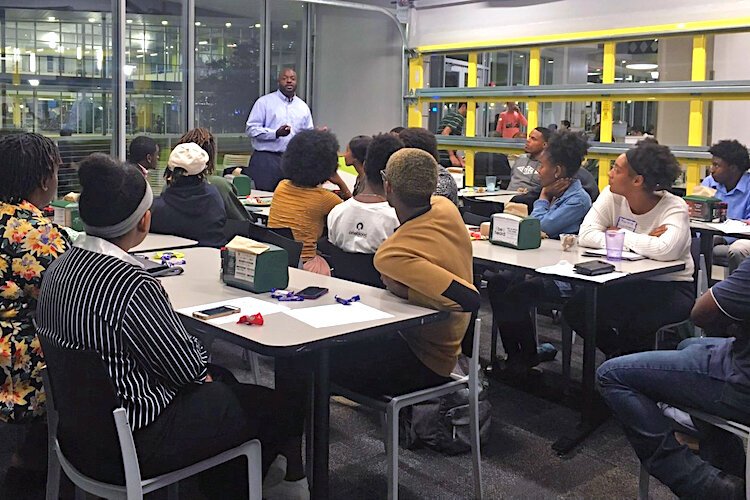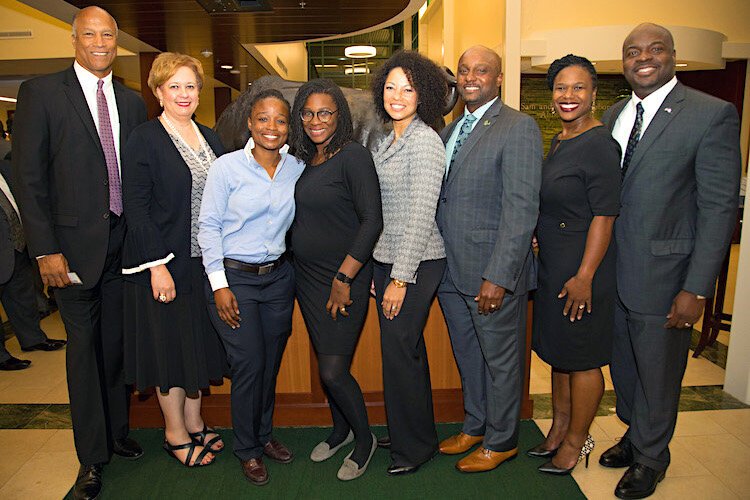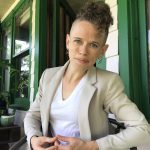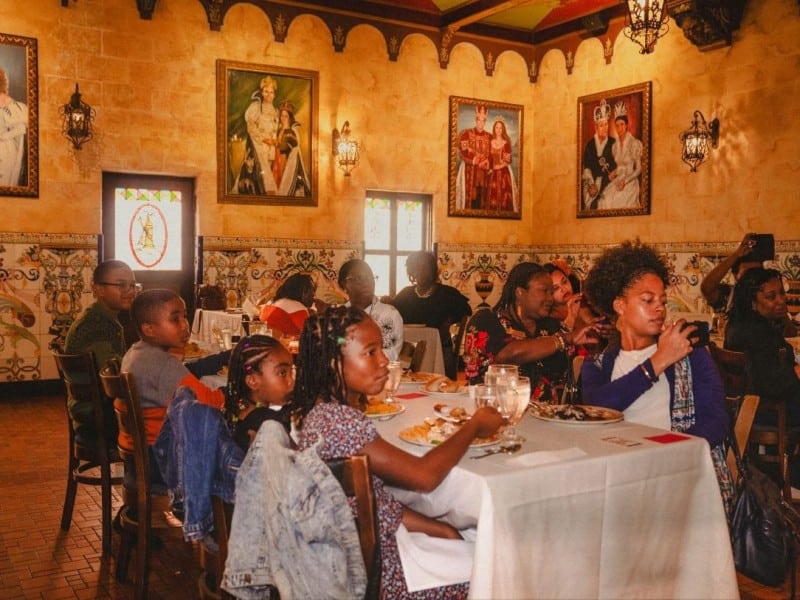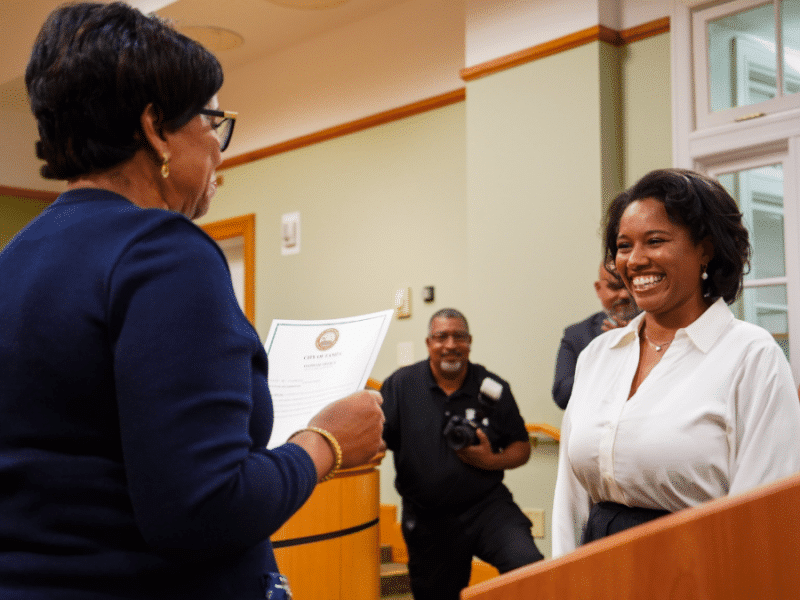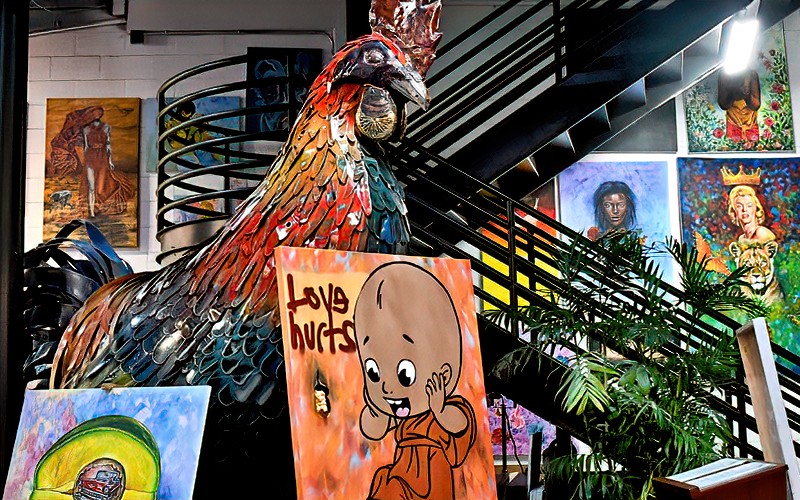Black Leadership Network at USF champions professional development, builds community
"The Black Leadership Network helps provide a viable pathway for students who want to attend USF, offers support while they are here, and opportunities for their careers and future when they graduate," says Walter Jennings, Assistant Director of Diversity Initiatives at USF in Tampa.
Tampa native and entrepreneur, Ashley Butler, has always been career-driven. From the moment she entered her undergrad in interpersonal and organizational communications at USF in 2001, Butler says she was set on one goal: graduate and get to work.
Today, she’s Fleet Manager for Butler Automotive Management, a concierge automotive service company based in Tampa, and operates a full-service automotive repair facility, Ice Cold Air, on South Dale Mabry Highway. But Butler says her path to success was self-motivated, and often forged on her own.
“Some people go to college and know right away they’ll pledge or get into sports or have groups or clubs they’ll join — but I wasn’t that person. I really just wanted to finish and go into making money. Looking back, I think it would have been beneficial if there were some structure in place to help me get there,” Butler says.
Butler is a founding member of USF’s Black Leadership Network, a membership-based group established in 2017 that focuses on enhancing educational and leadership opportunities for the university’s Black and African American students. Her co-founders are Jerry Bell, Ruth Bell, Adrien Julious-Butler, Rena Upshaw-Frazier, Anddrikk Frazier, Monica Narain, and Ed Narain.
“For me, I didn’t join a sorority that had programming, camaraderie, and built-in networking right out the gate. Though I did eventually become a Delta Sig when I became a business major,” Butler notes.
“At that point, email was really just getting started; there was a lot of technology taking off that really changed how we do things. And if some of the programs we have now were in place then, I think the college experience would have been different — and enhanced — for me,” she says.
Building the foundation for future generations of Black leadership
Butler and her wife and BLN co-founder, Adrien Julious-Butler, created the Adrien and Ashley Butler Possibility Scholarship endowment within BLN. To qualify for the scholarship, a student must demonstrate an interest in entrepreneurship, in the arts, or in creating positive impact in the LGBTQIA+ community. In total, the Black Leadership Network offers 29 scholarships, four of which are endowments.
Walter Jennings, Assistant Director of Diversity Initiatives, USF Foundation, notes there are currently 64 scholars enrolled in the Black Leadership Network, up from 44 scholars in 2019-2020, and 24 in BLN’s first year offering scholarships, 2018-2019. All students in the Black Leadership Network are recipients of BLN scholarships, Jennings says.
“The Black Leadership Network helps provide a viable pathway for students who want to attend USF, offers support while they are here, and opportunities for their careers and future when they graduate,” Jennings says.
“Our primary offices are located on the Tampa campus, however, our goal is to impact the quality of Black and African American students’ education and experiences on all three campuses,” he adds.
Jennings says BLN holds monthly meetings — currently virtual, due to COVID-19 — that are themed, led, and facilitated by BLN scholars. An eight-member student advisory group helps identify topics. Surveys offered at the end of BLN meetings and workshops inform each theme based on participants’ suggestions.
“We want to empower our scholars and students to take command of their future and be assertive with their presence. We’re not just guessing and hoping we’re affecting them, but being right there with the students to make sure their needs are being addressed,” Jennings says.
September’s monthly meeting explored financial literacy — ranging from tips on starting a savings account to a peek into the stock market, Jennings says. In October, a BLN scholar designed a topic called “Finding and Understanding Your ‘Why'” to provide members an opportunity to examine the major they chose and set goals for life after graduation.
The Black Leadership Network also offers monthly professional development training in conjunction with other USF Foundation organizations, including the Latino Scholarship Program and Women in Leadership & Philanthropy.
“It’s a great opportunity for scholars to interact with students who don’t necessarily look like them. In our October session, we focused on creating an elevator pitch, writing a resume, how to access the job market, how to get an interview — things students won’t necessarily receive in a classroom unless they take a professional development class,” Jennings says.
Fostering personal connections in an age of social distance
“We think it’s important, and our donors agree — it’s very important to put a face to the scholarship and support the students receive,” Jennings says.
Prior to the pandemic, BLN donors met in person with scholars and often attended the monthly BLN meetings. Currently, their connection is virtual, but the organization continues to emphasize the value of strong relationships between its donors and scholars, as well as promoting professional mentorship opportunities, and peer support programs for Black and African American students.
BLN’s Company Classroom Program pairs scholars with career professionals to offer mentorship and internship opportunities while they’re in school, and potential job placement after graduation. The Black Leadership Network also has a peer mentoring program that pairs upper-class scholars with incoming students to ensure internal support.
“As Black and African American students on campus, the lens through which they experience the university is a different experience. Scholars [in BLN peer mentoring] can confer on things like: ‘Where’s a good place to study after late night, after 12 o’clock? Or where’s a safe place to eat?’,” Jennings says.
Jennings also notes that when scholars write letters to their donors at the end of the school year, the Black Leadership Network encourages them to be honest and forthright about their experiences at USF so that the organization can identify any challenges students face, and offer relevant support.
“It doesn’t only have to be a positive ‘thank you’ letter,” says Jennings. “If you had a particularly difficult class or ran into challenges, the donors want to hear about those experiences — the good, the bad, and the ugly.”
Butler says that in this era of distanced digital engagement, she continues to prioritize her involvement in Black Leadership Network scholars’ lives at USF.
“If it’s on the BLN calendar, it’s on my calendar,” Butler says.
She adds that she hopes, during her tenure as an endowment chair in the organization, to help BLN model a framework so that other universities throughout the U.S. might establish financial support and mentoring networks for their own Black students.
“I think legacy is very important. I believe I am community made, and I believe that programming throughout my childhood — sporting activities; teachers I had — all poured into my success … BLN is a way to be part of this community: to be a welcoming set of arms, and, if they choose to come to a predominantly white college, to be a family for the Black talent who come to USF,” Butler says.
Jay Stroman, USF Foundation CEO, says:
“We are grateful to the founding members who brought BLN to life and to all donors who sustain this program, putting the scholars on a trajectory toward lifelong success. With each cohort of BLN scholars, the program grows stronger. It is our hope that even more members of the community will choose to support BLN so additional scholars can benefit from the mentorship, networking and professional development experiences it provides.”
To learn more and get involved, visit:

